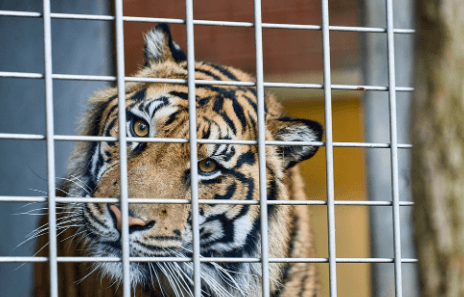A Wild Ride at the Exotic Animal Shelter in Lincoln, NE

When you think of animal shelters, you probably imagine dogs and cats waiting for homes. However, exotic animals also need care. In Lincoln, Nebraska, many exotic shelters offer a special place for these unique and often misunderstood creatures. Let’s analyze what makes the exotic animal shelter in Lincoln, NE, so different and how these shelters play an essential role in this world of unusual animals.
Unique Idea of Running an Exotic Animal Shelter in Lincoln, NE
Running an exotic animal shelter is a unique and challenging task. Unlike traditional shelters, it requires specialized knowledge and equipment to meet the needs of various animals. From reptiles to unusual birds, each type of animal has its own habitat, diet, and health requirements. Furthermore, educating the community about the responsibilities of owning exotic pets is vital for their long-term well-being. Through outreach programs and partnerships with zoos and veterinary schools, shelters can provide the best possible care. Additionally, by creating naturalistic environments, these animals can thrive while they wait for adoption.
Psychological Impact on Exotic Animals in Shelters
Exotic animals in shelters often face significant psychological challenges. Many of them come from stressful situations or neglect. Transitioning to a shelter can be safer, but it can also be overwhelming. Without proper stimulation, animals may become anxious or depressed. Moreover, the lack of a family environment can lead to behavioral problems. However, by providing mental enrichment—such as interactive toys and socialization—shelters can alleviate these negative effects. With consistent care and attention, shelters can significantly improve the mental well-being of these unique animals.
Nutritional Needs of Exotic Mammals in Shelters
Exotic mammals in shelters have specific nutritional needs that must be closely monitored to ensure their health. Unlike typical pets, these animals often need species-specific diets based on their natural eating habits. Here’s a closer look:
- Species-Specific Diets: Every exotic mammal requires a diet tailored to its natural behavior (e.g., herbivores, carnivores, or omnivores).
- Balanced Nutrient Intake: It’s essential to provide a proper balance of proteins, fats, vitamins, and minerals for overall health.
- Fresh, High-Quality Foods: Exotic mammals thrive on fresh fruits, vegetables, and meats, free from artificial additives.
- Specialized Supplements: Many exotic mammals may need extra supplements, like calcium and vitamins, to support their health.
- Hydration Needs: Clean, freshwater, or moisture-rich foods must always be available.
- Regular Monitoring: Frequent dietary assessments are necessary to ensure the animal receives the proper nutrition.
Why Should We Prioritize Mental Stimulation for Exotic Animals?
Exotic animals, especially birds and mammals, are intelligent. In captivity, they can get bored or stressed without enough mental stimulation. Many exotic shelters understand the importance of keeping these animals engaged. They use various techniques, such as puzzle feeders, interactive games, and socialization sessions, to ensure the animals remain mentally healthy. For example, birds may enjoy toys that challenge their problem-solving skills, while small mammals benefit from environments that allow them to explore and dig. Each animal has unique needs, and these exotic shelters work hard to meet them.
Bringing Nature Home for Exotic Creatures
One fascinating aspect of the exotic animal shelter in Lincoln, NE, is the effort to create natural habitats. Many exotic animals come from environments very different from Nebraska’s climate. Therefore, the shelter must recreate those conditions in the enclosures to keep the animals healthy and stress-free. For instance, tropical reptiles need high humidity, while desert reptiles require a dry and warm environment. Rainforest birds need ample space and greenery to mimic their natural habitat. JS Exotics invests considerable thought and effort into designing these spaces, ensuring that the enclosures provide both physical comfort and mental stimulation.
Busting Myths about Exotic Animal Shelters
Here are some common myths about exotic animal shelters, along with the facts:
- Myth 1: Exotic animal shelters only care for wild animals.
- Fact: They also care for various exotic pets like reptiles, birds, and small mammals.
- Myth 2: Exotic animals in shelters are always aggressive.
- Fact: With proper care and socialization, most rescued exotic animals become calm and friendly.
- Myth 3: Exotic animals in shelters cannot be adopted.
- Fact: Many exotic animals can be adopted after they have been rehabilitated and matched with responsible owners.
- Myth 4: Exotic animal shelters are overcrowded zoos.
- Fact: Shelters prioritize animal health and well-being by providing enough space and care.
- Myth 5: Exotic animal shelters are only for experts.
- Fact: Shelters often educate and prepare everyday people to adopt and care for exotic animals responsibly.
Socializing Exotic Animals for Future Adoption
Socializing exotic animals is crucial for preparing them for future adoption. Many of these animals come from challenging backgrounds, making them anxious or aggressive. Gentle handling and interaction can help build trust. Gradually introducing them to different stimuli, such as new people or environments, can ease their anxiety. Additionally, creating positive associations with humans through treats and toys can improve their behavior. Over time, consistent socialization allows these animals to adapt more quickly to new homes. Thus, shelters play a vital role in ensuring these animals are emotionally ready for adoption.
Conclusion
In conclusion, the exotic animal shelter in Lincoln, NE, is more than just a safe haven. It serves as a sanctuary, a rehabilitation center, and an educational resource for the community. Through their dedication to caring for unique creatures, JS Exotics offers these animals a second chance at life while helping to prevent future neglect and abandonment. With community support, education, and collaboration, these shelters in Lincoln, NE, ensure a better future for exotic animals in Lincoln and beyond. So, why just be normal? Go exotic and spice up your life! Contact Js Exotics now to meet our extraordinary animals and see how you can adopt them!





